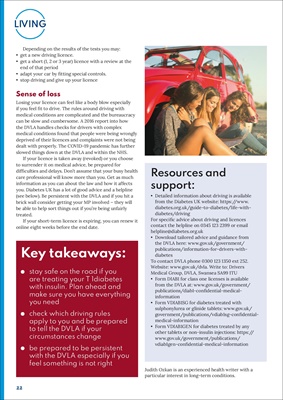
22
LIVING
Depending on the results of the tests you may:
• get a new driving licence.
• get a short (1, 2 or 3 year) licence with a review at the
end of that period
• adapt your car by fitting special controls.
• stop driving and give up your licence
Sense of loss
Losing your licence can feel like a body blow especially
if you feel fit to drive. The rules around driving with
medical conditions are complicated and the bureaucracy
can be slow and cumbersome. A 2016 report into how
the DVLA handles checks for drivers with complex
medical conditions found that people were being wrongly
deprived of their licences and complaints were not being
dealt with properly. The COVID-19 pandemic has further
slowed things down at the DVLA and within the NHS.
If your licence is taken away (revoked) or you choose
to surrender it on medical advice, be prepared for
difficulties and delays. Don't assume that your busy health
care professional will know more than you. Get as much
information as you can about the law and how it affects
you. Diabetes UK has a lot of good advice and a helpline
(see below). Be persistent with the DVLA and if you hit a
brick wall consider getting your MP involved - they will
be able to help sort things out if you're being unfairly
treated.
If your short-term licence is expiring, you can renew it
online eight weeks before the end date.
Key takeaways:
stay safe on the road if you
are treating your T 1diabetes
with insulin. Plan ahead and
make sure you have everything
you need
check which driving rules
apply to you and be prepared
to tell the DVLA if your
circumstances change
be prepared to be persistent
with the DVLA especially if you
feel something is not right
Resources and
support:
• Detailed information about driving is available
from the Diabetes UK website: https://www.
diabetes.org.uk/guide-to-diabetes/life-withdiabetes/driving
For specific advice about driving and licences
contact the helpline on 0345 123 2399 or email
helpline@diabetes.org.uk
• Download tailored advice and guidance from
the DVLA here: www.gov.uk/government/
publications/information-for-drivers-withdiabetes
To contact DVLA phone 0300 123 1350 ext 252.
Website: www.gov.uk/dvla. Write to: Drivers
Medical Group, DVLA, Swansea SA99 1TU
• Form DIAB1 for class one licenses is available
from the DVLA at: www.gov.uk/government/
publications/diab1-confidential-medicalinformation
• Form VDIAB1SG for diabetes treated with
sulphonylurea or glinide tablets: www.gov.uk/
government/publications/vdiab1sg-confidentialmedical-information
• Form VDIAB1GEN for diabetes treated by any
other tablets or non-insulin injections: https://
www.gov.uk/government/publications/
vdiab1gen-confidential-medical-information
Judith Ozkan is an experienced health writer with a
particular interest in long-term conditions.